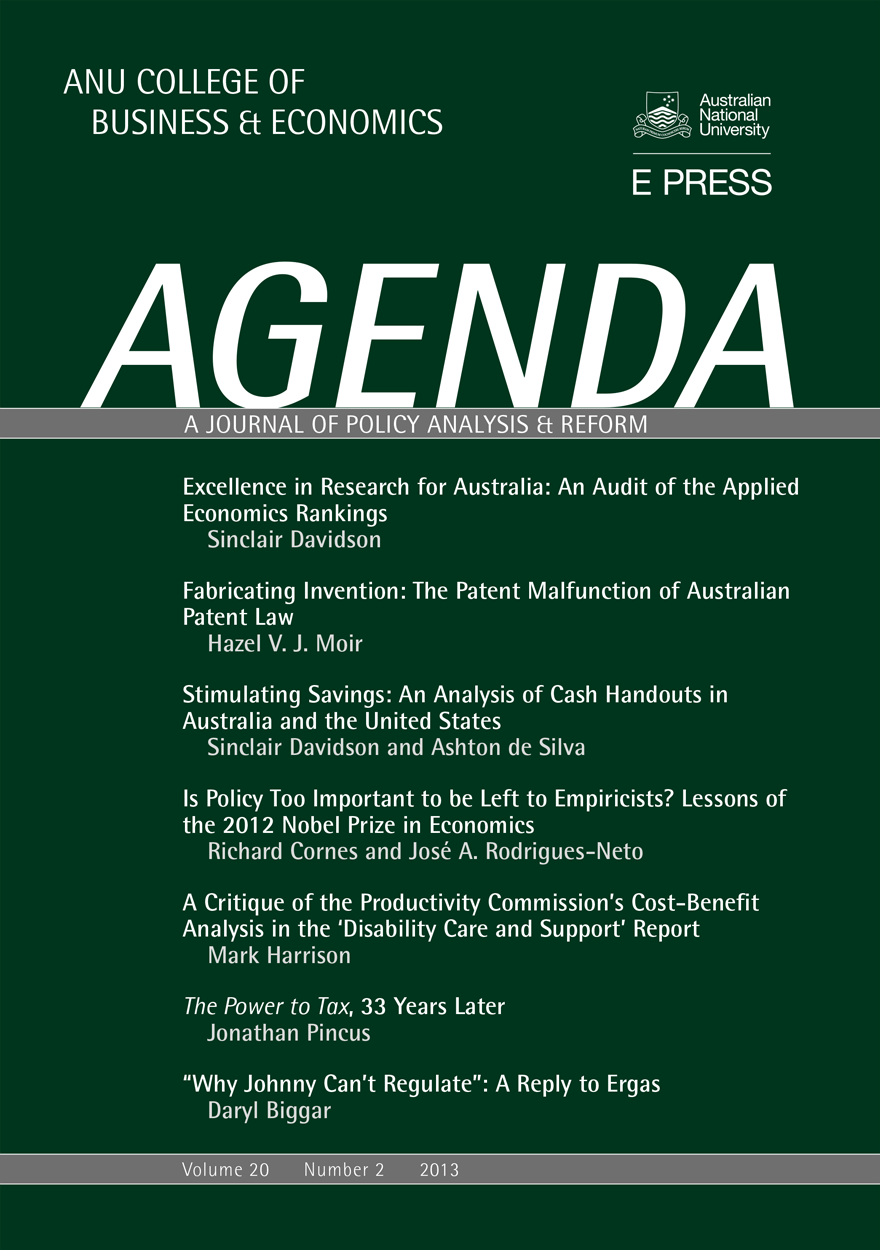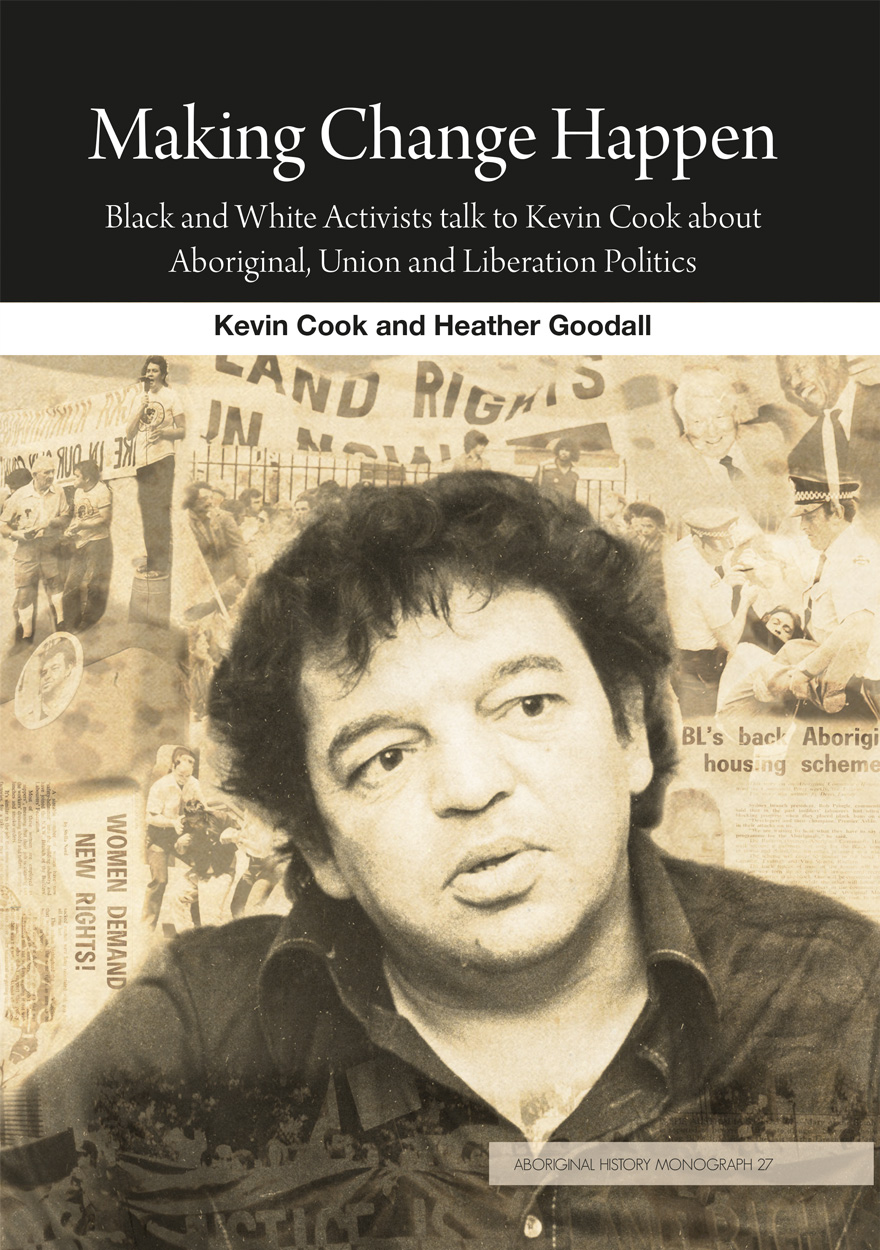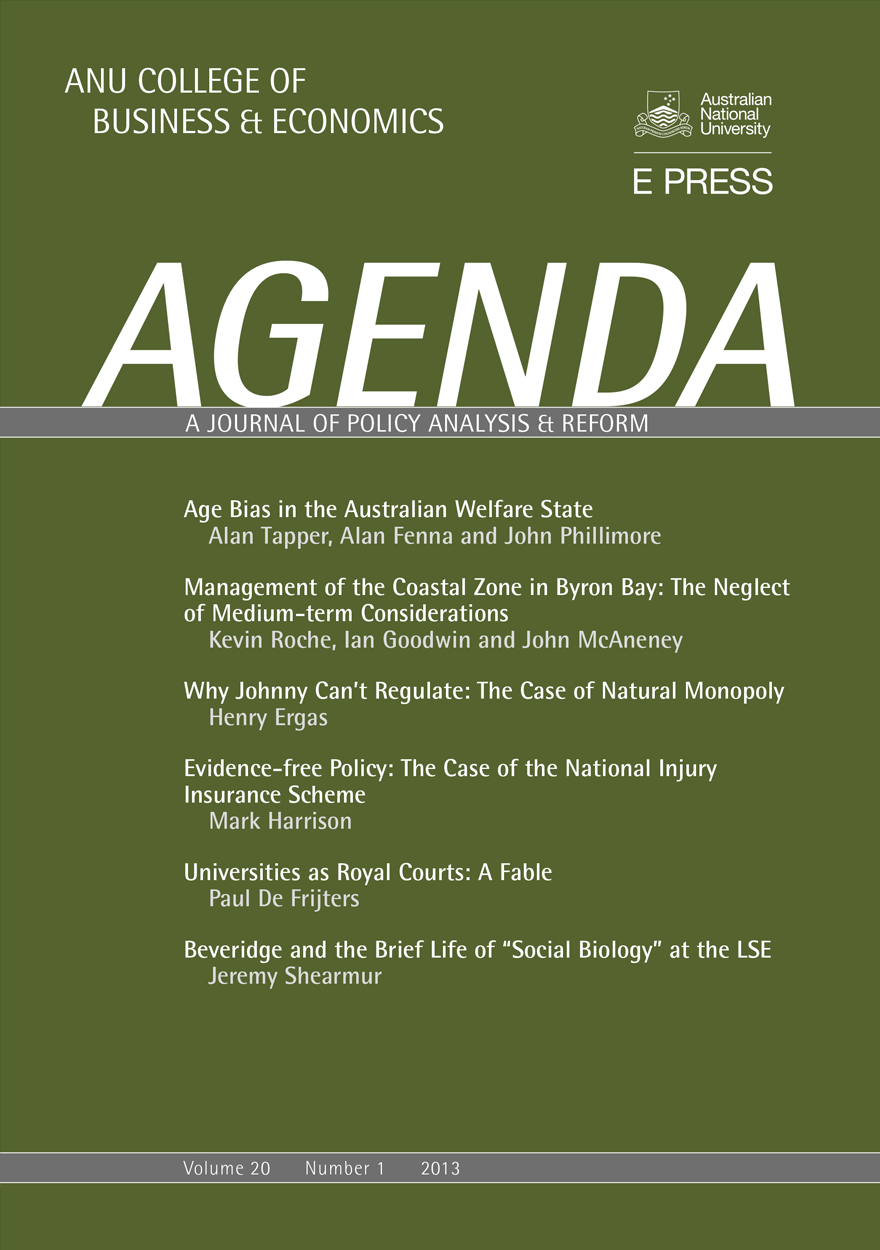Search titles
Displaying results 251 to 260 of 554.

Aboriginal History Journal: Volume 37 »
Edited by: Shino Konishi
Publication date: December 2013
In this volume, Tracey Banivanua Mar’s analysis of three moments of Indigenous protest in Tahiti, Victoria and New Zealand presents a new transnational history of indigenous political agency in the 1840s. In his study of British explorers’ encounters with Indigenous people in Queensland, Michael Davis analyses the interplay and connections between Indigenous knowledge and western ideas about the local environments. Liz Conor offers a fresh perspective on our understandings of cross-cultural gender relations by tracing the ‘black velvet’ trope, which characterised settler ideas about Aboriginal women in Northern. John Maynard’s study of Percy Haslam, an amateur enthusiast of the Awabakal language and culture, whose records have enabled the revitalisation of the local language. Colin Dyer has contributed a new resource for researchers by translating the nineteenth-century French traveller, Eugène Delessert’s observations of Aboriginal people and culture, based on his visit to Sydney in 1844–45. There is an obituary of the highly respected South Australian elder Thomas Edwin Trevorrow.
Aboriginal History Inc. is a publishing organisation based in the Australian Centre for Indigenous History, Research School of Social Sciences, The Australian National University, Canberra.
For more information on Aboriginal History Inc. please visit aboriginalhistory.org.au.
Download for free
Not available for purchase

Agenda - A Journal of Policy Analysis and Reform: Volume 20, Number 2, 2013 »
Publication date: December 2013
Agenda is a refereed, ECONLIT-indexed and RePEc-listed journal of the College of Business and Economics, The Australian National University. Launched in 1994, Agenda provides a forum for debate on public policy, mainly (but not exclusively) in Australia and New Zealand. It deals largely with economic issues but gives space to social and legal policy and also to the moral and philosophical foundations and implications of policy.
Subscribe to the Agenda Alerting service if you wish to be advised on forthcoming or new issues.
Download for free
Not available for purchase

Professionalism in the Information and Communication Technology Industry »
Edited by: John Weckert, Richard Lucas
Publication date: October 2013
Professionalism is arguably more important in some occupations than in others. It is vital in some because of the life and death decisions that must be made, for example in medicine. In others the rapidly changing nature of the occupation makes efficient regulation difficult and so the professional behaviour of the practitioners is central to the good functioning of that occupation. The core idea behind this book is that Information and Communication Technology (ICT) is changing so quickly that professional behaviour of its practitioners is vital because regulation will always lag behind.

The ADB's Story »
Edited by: Melanie Nolan, Christine Fernon
Publication date: October 2013
‘The Australian Dictionary of Biography captures the life and times and culture of this country in an absolutely distinctive and irreplaceable way. It is the indispensable record of who we are, and of the characters who have made us what we are. I could not be prouder of ANU’s continuing role as custodian of this crucial part of our national legacy.’
— Professor the Hon. Gareth Evans AC QC, Chancellor, The Australian National University
‘A mature nation needs a literary pantheon of inspiring and instructive life histories, a gallery of all the possibilities of being Australian. The Australian Dictionary of Biography responds to that vital need in our culture. It is a stunning collaborative achievement and I feel so proud that we have such an activity here in Australia—to a great extent it describes and defines Australia.’
— Professor Fiona Stanley AC, Australian of the Year, 2003
‘The Australian Dictionary of Biography is our greatest collective research project in the humanities and a national triumph. We have much to learn from it. The project is continuing to change as we mature nationally, with deeper understanding about the impacts of gender, race, environment, religion, education, language, culture, politics, region and war on what we are and what we may become.’
— The Hon. Dr Barry Jones AO
‘Australia is very fortunate to have a national biographical dictionary that is democratic as well as distinguished, one that represents the rich variety of Australian culture. The Australian Dictionary of Biography gathers together the stories of people from all walks of life, from the outback to the city and from the bush to the parliament. It is a monument of scholarship—and it is for everyone.’
— Dr Dawn Casey PSM
‘Few things are more illuminating than taking a random stroll through a volume of the Australian Dictionary of Biography—new insights into our greatest men and women, chance encounters with people whose exploits are all too often unpardonably overlooked. I first read the ADB with my mother, Coral Lansbury, who wrote four entries. One of her mentors, Bede Nairn, was a prodigious contributor. The Australian story is a story of Australians, no better told than in the ADB.’
— The Hon. Malcolm Turnbull MP
‘I find it difficult to bring to mind more than a handful of comparable enterprises in the fields of biography, history, philology or the social sciences more broadly—anywhere in the world. The status and appeal of the Australian Dictionary of Biography do not lie only in its scale and size. They reside also in the meticulous research, the erudition and scholarship, and the sweat and possibly tears involved in the editorial and publishing process. Its constituent dramatis personae are an eclectic mix of the noble and the notorious, the famous and the largely unsung. The underlying theme of the mosaic is quite clear: nothing less than the making and remaking of Australia.’
— Her Excellency Ms Penelope Wensley AC, Governor of Queensland

Making Change Happen »
Black and White Activists talk to Kevin Cook about Aboriginal, Union and Liberation Politics
Authored by: Kevin Cook, Heather Goodall
Publication date: September 2013
This book is a unique window into a dynamic time in the politics and history of Australia. The two decades from 1970 to the Bicentennial in 1988 saw the emergence of a new landscape in Australian Indigenous politics. There were struggles, triumphs and defeats around land rights, community control of organisations, national coalitions and the international movement for Indigenous rights. The changes of these years generated new roles for Aboriginal people. Leaders had to grapple with demands to be administrators and managers as well as spokespeople and lobbyists. The challenges were personal as well as organisational, with a central one being how to retain personal integrity in the highly politicised atmosphere of the ‘Aboriginal Industry’. Kevin Cook was in the middle of many of these changes – as a unionist, educator, land rights campaigner, cultural activist and advocate for liberation movements in Southern Africa, the Pacific and around the world. But ‘Cookie’ has not wanted to tell the story of his own life in these pages. Instead, with Heather Goodall, a long time friend, he has gathered together many of the activists with whom he worked to tell their stories of this important time. Readers are invited into the frank and vivid conversations Cookie had with forty-five black and white activists about what they wanted to achieve, the plans they made, and the risks they took to make change happen.
“You never doubted Kevin Cook. His very presence made you confident because the guiding hand is always there. Equal attention is given to all. I am one of many who worked with Cookie and Judy through the Tranby days and in particular the 1988 Bicentennial March for Freedom, Justice and Hope. What days they were. I’m glad this story is being told.”
— Linda Burney, MLA New South Wales
“Kevin Cook was a giant in the post-war struggle for Aboriginal rights. His ability to connect the dots and make things happen was important in both the political and cultural resurgence of the 1970s onwards.”
— Meredith Burgmann, former MLC, New South Wales
“Kevin has had a transformative effect on the direction of my life and the lives of so many other people. This book is an important contribution to understanding not only Kevin’s life but also the broader struggles for social and economic justice, for community empowerment and of the cooperative progressive movement. It will greatly assist the ongoing campaign for full and sustainable reconciliation.”
— Paddy Crumlin, National Secretary, Maritime Union of Australia
“Cookie has made great contributions in enhancing the struggles of our people. He is a motivator, an astute strategist, and an excellent communicator with wonderful people skills. It’s a pleasure to be able to call him a mate and a brother.”
— John Ah Kit, former MLA, Northern Territory
For more information on Aboriginal History Inc. please visit aboriginalhistory.org.au.

Breaking Japanese Diplomatic Codes »
David Sissons and D Special Section during the Second World War
Edited by: Desmond Ball, Keiko Tamura
Publication date: September 2013
During the Second World War, Australia maintained a super-secret organisation, the Diplomatic (or ‘D’) Special Section, dedicated to breaking Japanese diplomatic codes. The Section has remained officially secret as successive Australian Governments have consistently refused to admit that Australia ever intercepted diplomatic communications, even in war-time.
This book recounts the history of the Special Section and describes its code-breaking activities. It was a small but very select organisation, whose ‘technical’ members came from the worlds of Classics and Mathematics. It concentrated on lower-grade Japanese diplomatic codes and cyphers, such as J-19 (FUJI), LA and GEAM. However, towards the end of the war it also worked on some Soviet messages, evidently contributing to the effort to track down intelligence leakages from Australia to the Soviet Union.
This volume has been produced primarily as a result of painstaking efforts by David Sissons, who served in the Section for a brief period in 1945. From the 1980s through to his death in 2006, Sissons devoted much of his time as an academic in the Department of International Relations at ANU to compiling as much information as possible about the history and activities of the Section through correspondence with his former colleagues and through locating a report on Japanese diplomatic codes and cyphers which had been written by members of the Section in 1946. Selections of this correspondence, along with the 1946 report, are reproduced in this volume. They comprise a unique historical record, immensely useful to scholars and practitioners concerned with the science of cryptography as well as historians of the cryptological aspects of the war in the Pacific.
“This publication fills an important gap in the present available knowledge concerning code-breaking in Australia during World War II. It also gives overdue recognition to the important contribution made by David Sissons to this subject”.
— Professor John Mack, School of Mathematics and Statistics, University of Sydney.

Putting Citizens First »
Engagement in Policy and Service Delivery for the 21st Century
Publication date: August 2013
This book explores the ways in which governments are putting citizens first in their policy-making endeavours. Making citizens the focus of policy interventions and involving them in the delivery and design is for many governments a normative ideal; it is a worthy objective and sounds easy to achieve. But the reality is that putting citizens at the centre of policy-making is hard and confronting. Are governments really serious in their ambitions to put citizens first? Are they prepared for the challenges and demands such an approach will demand? Are they prepared to commit the time and resources to ensure genuine engagement takes place and that citizens’ interests are considered foremost? And, more importantly, are governments prepared for the trade-offs, risks and loss of control such citizen-centric approaches will inevitably involve?
The book is divided into five parts:
setting the scene: The evolving landscape for citizen engagement
drivers for change: Innovations in citizen-centric governance
case studies in land management and Indigenous empowerment
case studies in fostering community engagement and connectedness
case studies engaging with information technology and new media.
While some chapters question how far governments can go in engaging with citizens, many point to successful examples of actual engagement that enhanced policy experiences and improved service delivery. The various authors make clear that citizen engagement is not restricted to the domain of service delivery, but if taken seriously affects the ways governments conduct their activities across all agencies. The implications are enormous, but the benefits to public policy may be enormous too.

Ted Freeman and the Battle for the Injured Brain »
A case history of professional prejudice
Authored by: Peter McCullagh
Publication date: August 2013
This book recounts some experiences of young Australians with catastrophic brain injuries, their families and the medical system which they encountered. Whilst most of the events described occurred two to three decades ago they raise questions relevant to contemporary medical practice.
The patients whose stories are told were deemed to be ‘unsuitable for rehabilitation’ and their early placement in nursing homes was recommended. In 2013, it is time to acknowledge that the adage of ‘one size fits all’ has no place in rehabilitation in response to severe brain injury. Domiciliary rehabilitation, when practicable, may be optimal with the alternative of slow stream rehabilitation designed to facilitate re-entry into the community.
Patients’ families were impelled to undertake heroic carers’ commitments as a reaction to nihilistic medical prognoses. It is time for the Australian health care system to acknowledge those commitments, and the budgetary burden which they lift from the system by providing family members with support to retrieve career opportunities, most notably in education and employment, which have been foregone in caring.
Medical attendants repeatedly issued negative prognoses which were often confounded by the patient’s long term progress. Hopefully, those undertaking the acute care of young people with severe brain injury will strive to acquire an open mind and recognise that a prognosis based on a snapshot observation of the patient, without any longer term contact provides a flawed basis for a prognosis. The story of these patients and of Dr Ted Freeman has wider implications.

Discretion and Public Benefit in a Regulatory Agency »
The Australian Authorisation Process
Authored by: Vijaya Nagarajan
Publication date: July 2013
This book explores the manner in which a variety of public benefits such as environmental protection and consumer safety have been accommodated through the authorisation process within competition law and policy in Australia. While the regulator’s use of its discretion can be explained as a triumph of practice over theory, this book explores the potential for competition principles to be imbued by the wider discourses of democratic participation and human rights. In doing so it makes a significant contribution to the Australian competition policy as well as reconceptualising the way in which discretion is used by regulators.
… a very important and creative contribution to the literatures on both business regulation in general and Australian competition and consumer protection law in particular. It pays special attention to an everyday regulatory function that is often ignored in scholarship. And it is very important in challenging—on both empirical and normative policy oriented grounds—a narrowly economic approach to competition law, and proposing an alternative understanding and practice for the public benefit test in ACCC authorisations.
— Professor Christine Parker
The data Vij Nagarajan has analysed is quite unique in its focus. It is a kind of data and analysis that has not been completed before in the international literature. It is well written, theoretically sophisticated and incisive in its policy analysis.
— John Braithwaite

Agenda - A Journal of Policy Analysis and Reform: Volume 20, Number 1, 2013 »
Edited by: William Coleman
Publication date: July 2013
Agenda is a refereed, ECONLIT-indexed and RePEc-listed journal of the College of Business and Economics, The Australian National University. Launched in 1994, Agenda provides a forum for debate on public policy, mainly (but not exclusively) in Australia and New Zealand. It deals largely with economic issues but gives space to social and legal policy and also to the moral and philosophical foundations and implications of policy.
Subscribe to the Agenda Alerting service if you wish to be advised on forthcoming or new issues.
Download for free
Not available for purchase



